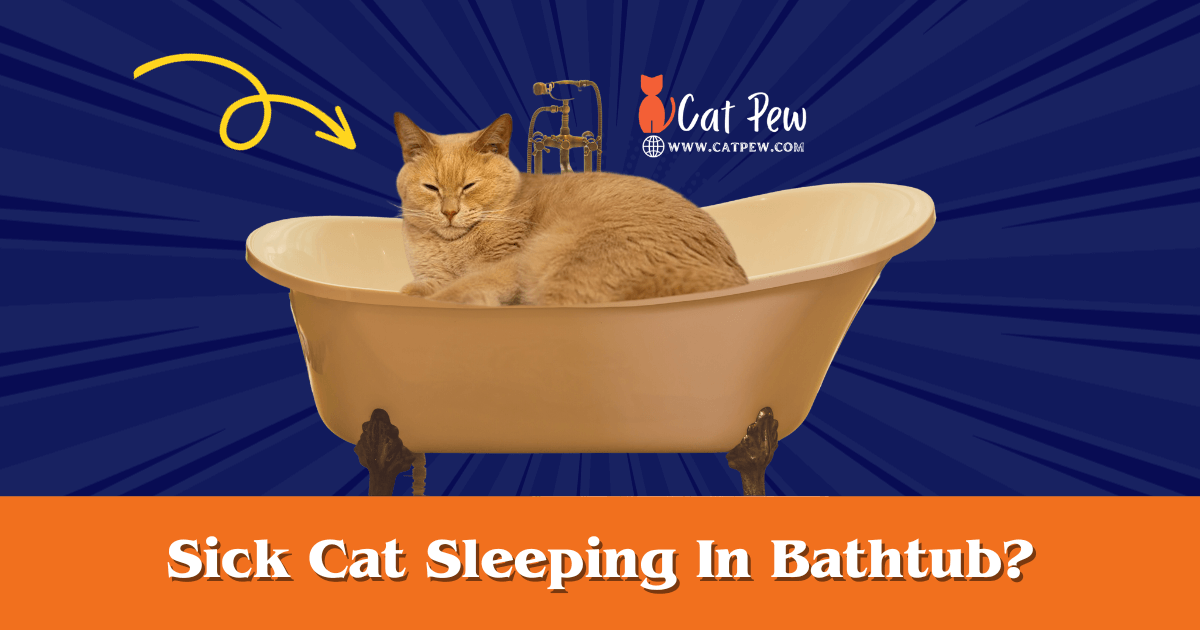A sick cat sleeping in the bathtub could be a sign of physical discomfort or illness. In such cases, it is important to observe the cat’s behavior and contact a veterinarian for a proper diagnosis and treatment.
Cats may seek cool surfaces like bathtubs during periods of illness or fever. It is crucial to monitor the cat’s eating, drinking, and bathroom habits, as well as any other accompanying symptoms, to determine the best course of action. Immediate veterinary attention may be necessary to address any medical issues and ensure the cat’s well-being.
Remember to consult a veterinarian for accurate advice tailored to your cat’s specific needs.
Why Do Cats Sleep In Unusual Places?
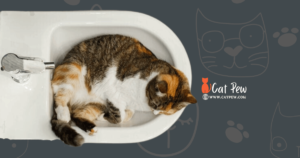
Why do cats sleep in unusual places? It’s a question many cat owners find themselves asking when they discover their feline friend curled up in a bathroom sink or snoozing in a shoebox. While it may seem strange to us humans, there are a few reasons why cats are drawn to these unconventional sleeping spots.
Cats’ Natural Instinct For Finding Cozy Spots
Cats are natural-born comfort seekers. Whether it’s a soft cushion, a warm sunbeam, or a cozy hiding spot, they have a knack for finding the most comfortable places to rest. This instinct stems from their wild ancestors who needed to find safe and comfortable spots to sleep in nature. So it’s no surprise that a sink or bathtub might hold a certain appeal to a cat in search of a peaceful slumber.
The Appeal Of Cool Surfaces Like Bathtubs
One of the main reasons cats may choose to sleep in bathtubs is the coolness of the surface. Cats have a higher body temperature than humans, and they rely on finding cool spots to regulate their heat. Bathrooms, particularly tiled ones, tend to be cooler than other rooms in the house, making them an attractive option for cats seeking relief from the heat. Additionally, porcelain bathtubs can provide a smooth and cozy surface for a cat to curl up on. The curved shape of the bathtub can create a secure and enclosed feeling for the cat, mimicking the comfort of a nest. It’s like a feline hammock, providing both support and comfort for a peaceful nap. Another reason cats may choose unusual sleeping spots like bathtubs is the element of seclusion. Cats are known for their independent nature, and they often seek out quiet and secluded areas where they can rest undisturbed. A bathtub tucked away in a corner of the house can provide the perfect combination of solitude and comfort for a cat in need of some downtime.
Signs Of A Sick Cat
A sick cat sleeping in the bathtub is one sign that something may be wrong. Keep an eye out for changes in appetite, behavior, and litter box habits, as these can indicate illness in your feline friend.
As pet owners, it is important to be attentive to the health and well-being of our furry companions. Cats, being masters of disguise when it comes to hiding their discomfort, can often exhibit subtle signs when they’re feeling unwell. Detecting these signs early can help ensure prompt medical attention and a speedy recovery. In this article, we’ll explore three common signs that may indicate your cat is sick: changes in sleeping patterns, lethargy lack of energy, and decreased appetite.
Changes In Sleeping Patterns
Sleeping is an essential part of a cat’s routine, and any significant change in their sleeping patterns can be a potential red flag. While cats are known for their love of slumber, excessive or prolonged periods of sleep can indicate underlying health issues. Conversely, if you notice that your usually active and playful cat has suddenly become restless and is having trouble settling down, it could be a sign of discomfort. Pay attention to any restless nights, restless tossing and turning, or frequent awakenings during sleep. These can be indications that something isn’t quite right.
Lethargy And Lack Of Energy
Lethargy, characterized by a lack of energy and an overall decrease in activity levels, is another possible sign of illness in cats. If you observe that your once lively and curious feline has become unusually sluggish, spending most of its time sleeping or lying down, it’s time to take notice. In addition to the physical aspect, behavioral changes like decreased interest in playing, grooming, or exploring can also accompany lethargy. Keep an eye out for a sudden loss of enthusiasm or a general lack of motivation as these could indicate an underlying health problem.
Decreased Appetite
Cats are known for their discerning palates and are usually eager eaters. Therefore, a sudden loss of appetite or a significant decrease in food consumption can be a cause for concern. If you notice that your cat is turning their nose up at meals they once devoured, or consistently leaving behind a large portion of their food, it may be time to investigate further. Decreased appetite can be an indication of various health issues, including dental problems, gastrointestinal discomfort, or even more serious medical conditions. Remember, while these signs can be indicative of illness, it is important to consult with a veterinarian for a definitive diagnosis. Regular monitoring of your cat’s well-being, combined with prompt veterinary attention when necessary, can help ensure a long and healthy life for your precious feline friend.
Common Reasons For Cats Sleeping In Bathtubs
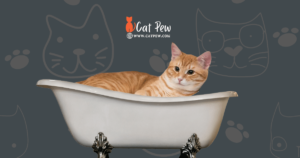
It is not uncommon to find your feline friend cozily snoozing in the bathtub. While this behavior may seem peculiar to us humans, there are several common reasons why cats choose the bathtub as their preferred napping spot. Understanding these reasons can help you provide a comfortable and enriching environment for your furry companion. In this article, we will explore three common reasons why cats sleep in bathtubs: seeking a cooler environment, finding solitude and peace, and using the tub as a familiar scent marker.
Seeking A Cooler Environment
One of the major reasons why cats may choose the bathtub as their sleeping spot is the cool surface it provides. Cats are naturally drawn to cool areas, especially during hot weather or when they are feeling overheated. The tub’s ceramic or porcelain material tends to retain coolness, making it the perfect spot for cats to relax and cool down. The smoothness of the tub also offers a pleasant surface for your furry friend to stretch out and enjoy a refreshing catnap.
Finding Solitude And Peace
Cats are known for their independent and solitary nature. They often seek out quiet and secluded spaces where they can retreat from the busyness of the household. The enclosed nature of a bathtub provides a sense of privacy and security for your cat, making it an attractive spot for them to unwind and recharge. The high sides of the tub can act as a barrier, shielding them from any potential disturbances and creating a serene and peaceful environment for uninterrupted sleep.
Using The Tub As A Familiar Scent Marker
Cats have a highly developed sense of smell and use scent marking as a way to communicate and establish their territory. By sleeping in the bathtub, your cat may be leaving their scent behind, creating a familiar and comforting environment for themselves. The unique scent of the tub becomes a personal marker for your cat, reassuring them of their territory and providing a sense of familiarity and security. Next time you find your furry companion curled up in the bathtub, remember that it is likely for one of these common reasons. Providing your cat with a cool and comfortable environment, as well as a peaceful and secure space, can help enhance their quality of sleep and overall well-being. Embrace their unique preferences and offer them a cat-friendly home that meets their needs.
Identifying Illness In A Cat Sleeping In The Bathtub
If you have noticed your furry friend sleeping in the bathtub more often than usual, it could be a sign of an underlying health issue. Cats are known for their preference for warm and comfortable spots to snooze, but choosing the bathtub as a sleeping spot can be indicative of distress or discomfort. In this article, we will explore possible health concerns associated with a sick cat sleeping in the bathtub, how to observe for additional symptoms, and when to consult with a veterinarian.
Observing For Additional Symptoms
When a cat starts sleeping in the bathtub unexpectedly, it’s crucial to keep a close eye on their overall behavior and look out for any additional symptoms that may accompany this change. Here are some signs that may indicate there is an underlying illness:
- Decreased appetite or sudden weight loss
- Lethargy and lack of energy
- Unusual changes in litter box habits
- Increased vocalization or restlessness
- Changes in drinking or urination patterns
- Visible signs of discomfort, such as limping or difficulty in moving
- Visible injuries or wounds
- Abnormalities in the coat or skin, including excessive shedding or dermatitis
It’s important to note that these additional symptoms can vary depending on the underlying health issue, and not all cats may display them. Therefore, it’s crucial to keep a watchful eye for any changes in your cat’s behavior or appearance.
Consulting With A Veterinarian
If you observe any of the aforementioned symptoms or notice that your cat’s behavior is abnormal or concerning, it’s best to consult with a veterinarian. A professional can conduct a thorough examination and provide an accurate diagnosis of your cat’s health condition. Early detection and treatment are essential for the well-being of your furry friend. Schedule an appointment with your veterinarian as soon as possible and provide them with a detailed history of your cat’s recent behavior and any observed symptoms. This information will assist the veterinarian in making a more accurate assessment of your cat’s health.
Potential Health Issues To Consider
Several potential health issues could be causing your cat to sleep in the bathtub:
| Health Issue | Symptoms |
|---|---|
| Urinary tract infection (UTI) | Painful urination, frequent trips to the litter box, blood in urine |
| Arthritis | Limping, difficulty jumping or climbing, stiffness |
| Gastrointestinal issues | Vomiting, diarrhea, decreased appetite |
| Dental problems | Bad breath, difficulty eating, swollen gums |
| Stress or anxiety | Excessive grooming, hiding, aggression |
These are just a few examples, and it’s important to remember that only a veterinarian can provide an accurate diagnosis based on your cat’s individual symptoms and medical history. In conclusion, if your cat starts sleeping in the bathtub, it’s essential to observe for any additional symptoms and consult with a veterinarian if there are concerns. By being proactive in identifying potential health issues, you can ensure that your beloved feline companion receives the necessary care and attention to recover and thrive.
Creating A Comfortable Sleeping Environment For A Sick Cat
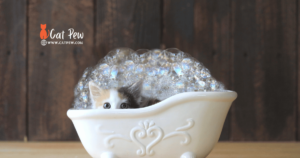
If you have a sick cat, providing them with a comfortable sleeping environment is essential for their recovery. Cats, in general, are known to be creatures of comfort, and when they’re unwell, their need for a cozy spot becomes even more crucial. Creating this ideal sleeping environment includes considering factors such as providing a soft and warm bed, ensuring proper ventilation, and minimizing disturbances and noise. Here, we’ll explore each of these aspects to help you create the perfect resting space for your sick feline friend.
Providing A Soft And Warm Bed
A sick cat needs a soft and warm bed to promote rest. Consider investing in a cat bed that is plush and comfortable for your furry friend. Opt for materials that are gentle on their delicate skin, such as microfiber or fleece, and ensure that the bed is adequately padded to provide extra cushioning. You can enhance their comfort by placing a soft blanket or towel in the bed, allowing them to snuggle and feel secure. Remember, a comfortable bed can go a long way in helping your sick cat feel more at ease.
Ensuring Proper Ventilation
Proper ventilation is essential for maintaining a healthy sleeping environment for your sick cat. Ensure that the room they sleep in has sufficient air circulation. This can be achieved by keeping windows slightly open or using a fan to circulate the air. Proper ventilation helps prevent stuffiness, keeps the air fresh, and reduces the risk of respiratory issues that can arise from a lack of fresh air flow. Your cat will appreciate the cool, fresh air, which can contribute to their overall well-being and comfort during their recovery.
Minimizing Disturbances And Noise
A quiet sleeping environment is crucial for a sick cat to rest and recuperate. Minimize disturbances and noise that could disrupt your cat’s sleep. Choose a room that is away from heavy foot traffic or noisy appliances, such as refrigerators or washing machines. Additionally, consider using curtains or blinds to block out excessive light, as cats prefer a dimmer sleeping environment. By providing a peaceful space, you’re helping your cat conserve their energy and focus on healing.
Promoting A Healthy Sleep Routine For Your Sick Cat
When our furry feline friends fall ill, it’s essential to provide them with a comfortable environment that promotes restful sleep. Just like humans, a solid sleep routine plays a crucial role in the healing process and overall well-being of our sick cats. In this article, we will explore effective strategies for establishing a consistent sleep schedule, encouraging relaxation techniques, and considering the impact of sunlight and artificial lighting.
Establishing A Consistent Sleep Schedule
One of the key factors in improving your sick cat’s sleep routine is establishing a consistent sleep schedule. Cats are creatures of habit, and by maintaining regular sleep patterns, we can help them feel more secure and relaxed. Schedule their feeding times and play sessions around a fixed bedtime, ensuring they have ample time to wind down. Consider creating a calming bedtime routine for your cat by:
- Dimming the lights in the evening
- Engaging in a relaxing play session
- Providing a cozy and quiet sleeping area
By adhering to a consistent sleep schedule, you can help your sick cat feel more at ease and promote better overall sleep quality.
Encouraging Relaxation Techniques
Just like humans, cats can benefit from various relaxation techniques to destress and promote sleep. Providing your sick cat with a designated relaxation space can work wonders for their sleep routine.
- Using a soft and plush bed
- Ensuring the sleeping area is quiet and away from distractions
- Using lavender scents or pheromone diffusers to create a calm environment
Additionally, incorporating gentle massage or brushing sessions can help soothe your sick cat and promote relaxation before bedtime. Always remember to use gentle and slow movements, paying attention to their body language to ensure they are comfortable.
Sunlight And Artificial Lighting Considerations
Sunlight and artificial lighting can greatly impact your sick cat’s sleep routine. Understanding their preferences and making appropriate adjustments can contribute to a healthier sleep-wake cycle. Here are some considerations to keep in mind:
| Sunlight Exposure | Artificial Lighting |
|---|---|
| Ensure your sick cat has access to natural light during the day, as it helps regulate their internal clock and promotes better sleep at night. | Avoid using bright and harsh artificial lighting at night to mimic a natural nighttime environment. Instead, opt for softer, dimmer lights that promote relaxation. |
| Consider placing their sleeping area near a window where they can bask in sunlight, but ensure it’s not too hot or cold for their comfort. | Install blackout curtains or blinds to minimize external light sources that may disrupt their sleep, especially if they are sensitive to light. |
By considering the impact of sunlight and artificial lighting, we can create an environment conducive to peaceful sleep, aiding in the recovery process for our sick cats.
Tips For Monitoring Your Sick Cat’s Sleep In The Bathtub
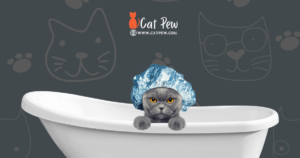
Identification Of Changes In Behavior Or Routine
- Decreased appetite or water intake
- Reduced playfulness or reluctance to engage in usual activities
- Changes in litter box habits
- Increased aggression or irritability
- Weight loss or gain
Observing Sleep Quality And Duration
- Quality of sleep: Is your cat restless, constantly shifting positions, or showing signs of discomfort?
- Duration of sleep: Does your cat sleep excessively or appear restless, struggling to find a comfortable position?
Tracking Any Sleep-related Issues
- Excessive snoring or breathing difficulties while sleeping
- Restlessness during sleep, such as twitching or frequent waking
- Any signs of pain or discomfort when moving in and out of the tub
- Changes in sleep patterns or duration over time
Seeking Veterinary Care For A Sick Cat Sleeping In The Bathtub
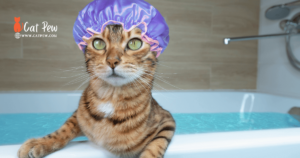
Having a sick cat sleeping in the bathtub is concerning. Don’t delay seeking veterinary care to ensure their health and well-being.
Understanding When To Consult A Vet
If you have noticed your sick cat sleeping in the bathtub, it’s important to evaluate the situation and determine whether veterinary care is necessary. While cats are known for their love of naps, finding your feline friend consistently seeking refuge in the bathtub could be a sign of underlying health issues. It’s important to be vigilant and watch for any changes in your cat’s sleeping habits. If you notice any concerning symptoms or behaviors, it’s time to consult a veterinarian for a thorough examination.
Discussing Your Observations And Concerns
When you bring your sick cat to the veterinarian, it’s essential to communicate your observations and concerns. Your veterinarian will rely on the information you provide to make an accurate diagnosis and recommend proper treatments. Make note of changes in your cat’s appetite, behavior, or litter box habits. Keeping a log of your observations can be helpful, including whether your cat has been coughing, sneezing, or displaying unusual lethargy. By sharing these details with your vet, you enable them to have a comprehensive understanding of your cat’s health.
Potential Treatments And Next Steps
Once you have discussed your concerns with your veterinarian, they will conduct a thorough examination of your sick cat. Based on their findings, they may recommend additional tests such as blood work, X-rays, or ultrasounds to further assess your cat’s condition. Depending on the diagnosis, your veterinarian may prescribe medications, recommend dietary changes, or suggest other treatment options. It’s crucial to follow your vet’s instructions diligently to ensure the best possible outcome for your sick cat. In conclusion to seeking veterinary care for a sick cat sleeping in the bathtub, it’s important to continuously monitor your cat’s sleeping habits and overall health. If you have any concerns, don’t hesitate to consult a veterinarian as they are the best resource for diagnosing and treating any underlying health issues your cat may have. By being proactive and seeking appropriate care, you can help improve your cat’s well-being and ensure they enjoy a long and healthy life.
Frequently Asked Questions On Sick Cat Sleeping In Bathtub
Why Is My Cat Suddenly Sleeping In The Bathtub?
Cats may sleep in the bathtub due to its cool and smooth surface, providing relief during warm weather. Make sure your cat has a comfortable and shaded sleeping spot suitable for its needs.
Do Cats Sleep When Sick?
Yes, cats do sleep when sick. Sleeping helps cats conserve energy and promotes healing. It is normal for sick cats to sleep more than usual.
How Much Do Cats Sleep When Sick?
Cats sleep more when they are sick, usually around 18-20 hours per day.
Why Did My Cat Sleep In The Sink?
Cats sleep in sinks for various reasons. They may find the coolness and smoothness of the surface appealing. It could also be a comfortable and secure spot to relax. Additionally, cats are naturally curious creatures, so exploring new areas like sinks can be a source of entertainment for them.
Conclusion
To conclude, finding a sick cat sleeping in the bathtub can be quite alarming. It is essential to assess their behavior and monitor their health closely. Providing comfort, warmth, and a quiet environment can aid in their recovery. Nonetheless, if their condition worsens or remains unchanged, seeking veterinary assistance is crucial.
By understanding their needs and offering proper care, we can help our furry companions regain their vitality and well-being.

Winston
I'm Winston, the author of this feline-focused (Catpew.com) blog . My love for cats goes back to my childhood, when I spent countless hours playing with my family's tabby, Mittens. This furry friend instilled in me a deep appreciation for the unique personalities, playful nature, and unconditional love that cats offer.

